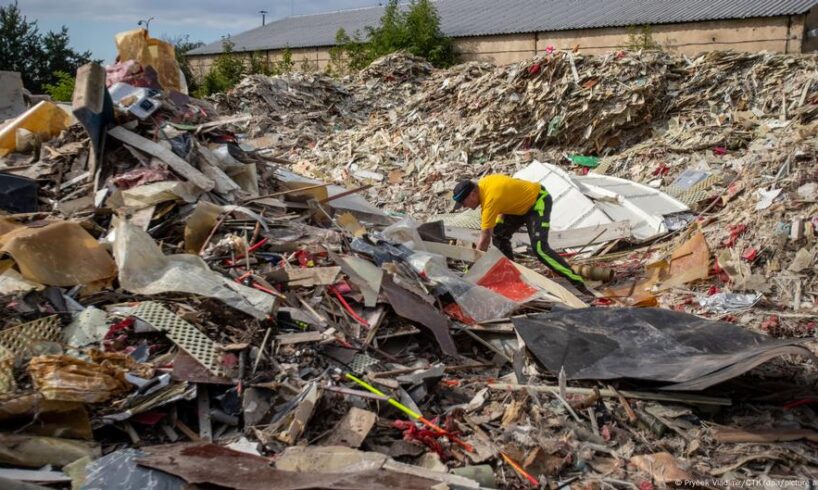
In the dead of the night in December, tons of trash mixed with fiberglass debris from wind turbine blades, shredded hard-drives and car batteries were dumped in the small Czech municipality of Jirikov.
If it weren’t for mayor Barbora Siskova, the pile of waste that has blotted the landscape ever since would have been even higher. She stopped further trucks sent by a German company seeking to offload more toxic waste weeks after the initial dump.
“I was shown documents that were supposed to prove this is all okay and legal,” she told DW, “but I could see at first glance that this wasn’t right.”
According to the paperwork, the trash to be dumped at the site was plastic waste waiting to be recycled, she said.
“But you could see right away that these weren’t plastic bottles or bags full of pure plastic.”
How did hazardous trash end up in Jirikov?
Siskova says a Czech man showed up, pretending to be interested in renting and later buying a former sawmill in Jirikov. He claimed to want it to set up a plastic recycling plant, and that he would temporarily store some materials out in the open.
“The Czech man paid rent once, dumped the trash here and disappeared,” she said.
With the help of Czech police and customs officers, she managed to send back the further trucks of hazardous waste and kicked off an investigation.
How hazardous waste from Germany ended up in a Czech village
To view this video please enable JavaScript, and consider upgrading to a web browser that supports HTML5 video
Other dump sites have since been found in other Czech municipalities, such as in Horni Herspice on the outskirts of the city of Brno.
German authorities have detained the CEO of a German waste management company from Bavaria, along with a Czech truck driver in connection to the case. They are under investigation for illegally sending waste across borders in 21 counts since 2022, deliberately mislabeling trash to skirt requirements.
“The company definitely hasn’t done this here in Jirikov for the first time,” mayor Siskova said.
Who’s paying for the cleanup?
Since the waste management company has gone bust, the cleanup process had been stalled for months and authorities in Germany and the Czech Republic have been left to deal with the mess.
Trash removal of around 300 tons of waste finally kicked off this week, mayor Siskova reported, with the first truck leaving for Germany on Monday. “By the end of next week, it all is supposed to be gone,” she said.
The first batch of composite waste has already been shipped off to a facility in the German state of Thuringia. Roughly 260 tons of glass fiber and carbon fiber reinforced plastic waste from items such as rotor blades used for wind energy will be taken to a central site in Hof/Oberfranken in Bavaria and will then sorted, according to the local authorities involved in the cleanup.
The process “is expected to be completed soon,” a spokesperson of the local Oberpfalz government in the state of Bavaria confirmed to DW, adding that they were unable to say how much the cleanup would cost.
Since the company allegedly responsible for the dump is now insolvent, the state of Bavaria is paying to have the trash removed.
“It is currently unclear to what extent these costs will be reimbursed to the state of Bavaria in the ongoing insolvency proceedings.”
Environmental fallout still unclear
Once the cleanup in Jirikov is complete, soil and water samples will be taken to investigate whether any environmental damage has been caused, mayor Siskova said.
Trash was picked up to be sent back to Germany for processing (photo courtesy of Jirikov mayor Siskova)Image: Barbora Siskova
Analysis from samples taken from Czech environmental organization Arnika back in March found a range of toxins at the site, such as pesticides and compounds of forever chemicals, known as PFAS. These substances were not only present in the waste, but in the surrounding soil, indicating that contaminants are leaching from the waste into the environment.
“Some concentrations were higher than those found at electronic waste sites in Thailand’s Kalasin province”, which had been a toxic hotspot for years.
“PFAS compounds showed high mobility with potential for groundwater contamination,” Nikola Jelinek, Arnika’s expert on toxic substances in the environment told DW.
A cross-border waste problem
Czech politicians say such waste dumping is a pan-European issue.
“The problem of illegal cross-border waste exports must be addressed at the European level,” a spokesperson for the country’s environment minister, Petr Hladik, told DW, adding the minister had pushed for more cooperation in the spring.
“Illegal waste shipments are a serious form of environmental crime, often motivated by economic factors,” he said.
And it’s a lucrative criminal business. In February this year, Croatian law enforcement authorities arrested 13 people suspected of being part of an environmental crime network, the European law enforcement agency EUROPOL reported.
Their ringleaders are believed to have orchestrated the illegal import of hazardous waste from Germany, Italy and Slovenia to Croatia, dumping or burying trash instead of properly treating it. That reportedly netted them a profit of at least €4 million ($4.7 million).
“Multiple countries across Europe are currently dealing with significant issues related to illegal waste disposal and cross-border waste trafficking,” Arnika’s Jelinek said.
“The problem has been exacerbated by stricter regulations in Asian countries that previously accepted European waste, leading to increased illegal dumping within Europe itself,” she said, pointing to Poland, Slovakia, Romania, Bulgaria and Croatia as recent hotspots for illegal waste dumping.
“Criminal organizations have increasingly turned to waste trafficking due to its high-profit margins and relatively low enforcement risk,” she added.
How to prevent such environmental crimes?
These crimes often cause irreparable damage to the environment, said EUROPOL, adding that they are usually combined with false documents and financial crimes such as corruption and money laundering.
“The Jirikov case shows that preventing illegal dumping in the future requires much stronger cross-border cooperation and accountability,” Jelinek said.
Cleanup of the trash in Jirikov will take about two weeks, mayor Siskova saidImage: Pryèek Vladimír/CTK/dpa/picture alliance
The European Anti-Fraud Office OLAF recently set up a Waste Shipment Enforcement Group that’s been tasked with improving enforcement and operational cooperation, both within the EU and with third countries. OLAF monitors suspicious waste shipments with customs and environmental authorities.
“Waste must be traceable across the EU, with digital tracking and transparent databases that cannot be manipulated,” Jelinek said.
This has also been echoed by mayor Siskova who welcomes EU-wide digital documentation that’s scheduled to come next year. “And the fines should be higher,” she said.
As of now, it looks like the German taxpayer is going to have to foot the bill of the cleanup.
“Prevention also means investing in safe treatment capacity, stricter penalties, and faster legal procedures,” said Jelinek, “so that companies cannot profit from insolvency or loopholes while the waste remains in place.”
Edited by: Tamsin Walker





